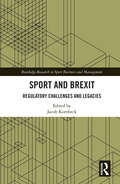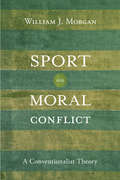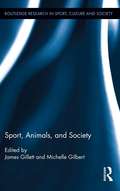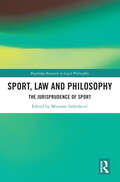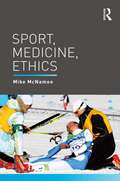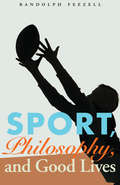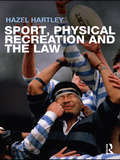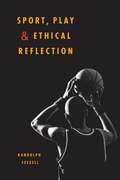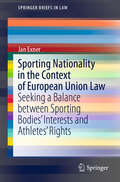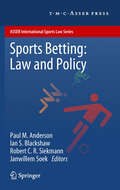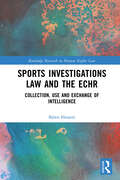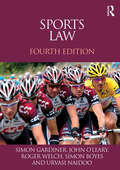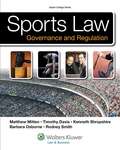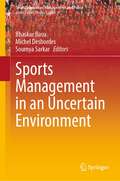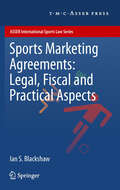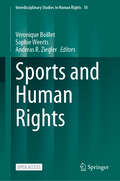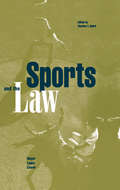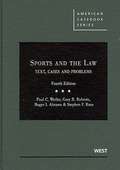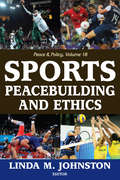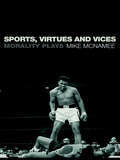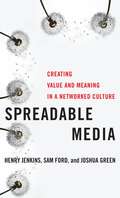- Table View
- List View
Sport and Brexit: Regulatory Challenges and Legacies (Routledge Research in Sport Business and Management)
by Jacob KornbeckThis is the first book to investigate the significance of Brexit for sport, with a particular focus on the regulatory and legal challenges that it poses, and the economic and political stresses that are likely to follow in its wake. Written by a team of leading researchers working across sport studies, legal studies and political science, and edited by an EU official with nearly two decades of experience working in EU sport policy, the book explains why regulation, and European dis-integration, matter to sport. It examines key topics including free movement, State aid and labour law, and considers the interests of key stakeholders from fans to football clubs to governing bodies. This is an essential reference for any advanced student, researcher, policy maker, administrator or industry professional working in sport, international law, political science, or international business and management.
Sport and Moral Conflict: A Conventionalist Theory
by William J. MorganWhat is the purpose of sport, and how are ethical conceptions of sport shaped by the answers to this question? In Sport and Moral Conflict, William Morgan investigates, examining sport as a moral crucible that puts athletes in competitive, emotionally charged situations where fairness and equality are contested alongside accomplishment. Morgan looks at the modern Olympics—from 1906 Athens to 1924 Paris, when the Games reached international prestige — in order to highlight the debate about athletic excellence and the amateur-professional divide. Whereas the Americans emphasized winning, the Europeans valued a love of the game. Morgan argues that the existing moral theories of sport—formalism and broad internalism (aka interpretivism), which rely on rules and general principles—fall short when confronted with such a dispute as the transition from amateur to professional sport. As such, he develops a theory of conventionalism, in which the norms at work in athletic communities determine how players should ethically acquit themselves. Presenting his case for an ethical theory of sport, Morgan provides insights regarding the moral controversies and crises that persist today.
Sport in Kultur und Gesellschaft: Handbuch Sport und Sportwissenschaft
by Michael Krüger Dieter Hackfort Eike Emrich Freya Gassmann Christian PierdziochDieses Handbuch bietet einen kompletten Überblick über die zentralen Themen der Sozialwissenschaften im Sport. Es richtet sich an das breite Publikum der Fachleute, Lehrenden und Wissenschaftler*innen in Sport und Sportwissenschaft. Hier können Sie sich kompakt und kompetent über den Stand der Wissenschaft zur Kultur des Sports informieren. Das Handbuch ersetzt bisherige Lexika und Handbücher zum Sport. Die Texte sind verständlich formuliert und anschaulich aufbereitet. Die knapp 50 Kapitel in diesem Band geben Ihnen den aktuellsten wissenschaftlichen Stand über die ökonomischen, sozialen, kulturellen, politischen, rechtlichen, pädagogischen und psychologischen Zusammenhänge des Sports. Zudem erhalten Sie Hinweise auf die wichtigste nationale und internationale Forschungsliteratur. Die Herausgeber: Arne Güllich ist Professor für Sportwissenschaft und leitet das Fachgebiet Sportwissenschaft an der TU Kaiserslautern. Er forscht in den Bereichen Jugendsport, Talententwicklung, Training und Förderstrukturen. Güllich hat zuvor im Deutschen Olympischen Sportbund als Leiter der Stabsstelle Grundsatzfragen gearbeitet. Praxiserfahrungen hat er als Trainer vom Jugendbereich bis zu den Olympischen Spielen gesammelt. Michael Krüger ist Professor für Sportwissenschaft an der Westfälischen Wilhelms-Universität zu Münster. Seine Forschungsschwerpunkte liegen im Bereich der Sportpädagogik und -geschichte, der wissenschaftstheoretischen Grundlagen der Sportwissenschaft, der olympischen Geschichte und Erziehung sowie von ethischen und pädagogischen Fragen des Sports. Er ist Verfasser und Herausgeber zahlreicher wissenschaftlicher Arbeiten zum Sport sowie mehrerer Lehr- und Handbücher zur Sportwissenschaft und Sportpädagogik.
Sport und öffentliche Finanzen: Die sportbezogenen Einnahmen und Ausgaben öffentlicher Haushalte in Deutschland (essentials)
by Tim Pawlowski Christoph BreuerDem Sport werden zahlreiche Gemeinwohlfunktionen zugeschrieben. Aus diesem Grund wird er mit öffentlichen Mitteln gefördert. In welchem Umfang der Sport in Deutschland auf diese Weise gefördert wird und insbesondere welche Mittel aus dem Sport wieder an die öffentlichen Haushalte zurückfließen, war bislang unklar. Auf Basis einer Vielzahl von Datenquellen werden in diesem Beitrag die sportbezogenen direkten Einnahmen und Ausgaben der öffentlichen Haushalte systematisch abgeschätzt. So ergibt sich - je nach Abgrenzung des Sportsektors - ein differenziertes Bild der finanzpolitischen Bedeutung des Sports in Deutschland.
Sport, Animals, and Society (Routledge Research in Sport, Culture and Society #31)
by James Gillett Michelle GilbertThis book advances current literature on the role and place of animals in sport and society. It explores different forms of sporting spaces, examines how figures of animals have been used to racialize the human athlete, and encourages the reader to think critically about animal ethics, animals in space, time and place, and the human-animal relationship. The chapters highlight persistent dichotomies in the use of and collaboration with animals for sport, and present strategies for moving forward in the study of interspecies relations.
Sport, Law and Philosophy: The Jurisprudence of Sport (Routledge Research in Legal Philosophy)
by Miroslav ImbriševićSport, Law and Philosophy: The Jurisprudence of Sport discusses the intersection of law and sport and highlights its usefulness to both legal scholars and philosophers of sport. There is a general recognition that law and sports bear strong similarities. Both can be understood as systems of rules, with a judge/referee who has the power to adjudicate and to issue punishments/penalties. Divided into two parts, this volume presents an exploration of central philosophical issues arising from the intersections of law and sport and makes reference to current events and controversies. Experts from across the globe discuss a range of issues such as sports as legal systems, the game as a social contract, the role of the referee, including VAR, rule breaking, equality in women’s sport, justice on the sports field and in the court room, and issues surrounding the application of law to sports. The book will be a valuable resource to Undergraduates, Postgraduates and for those working in the areas of legal philosophy, sports law, and philosophy of sport.
Sport, Medicine, Ethics
by Mike McNameeThe ethics of sports medicine is an important emerging area within biomedical ethics. The professionalization of medical support services in sport and continuing debates around issues such as performance-enhancing technologies or the health and welfare of athletes mean that all practitioners in sport, as well as researchers with an interest in sports ethics, need to develop a clear understanding of the ethical aspects of the sport–medicine nexus. This timely collection of articles explores the conceptual and practical issues that shape and define ethics in sports medicine. Examining central topics such as consent, confidentiality, pain, doping and genetic technology, this book establishes an important baseline for future academic and professional work in this area.
Sport, Philosophy, and Good Lives
by Randolph FeezellThere&’s more to sports than the ethos of competition, entertainment, and commercialism expressed in popular media and discourse. Sport, Philosophy, and Good Lives discusses sport in the context of several traditional philosophical questions, including: What is a good human life and how does sport factor into it? To whom do we look for ethical guidance? What makes human activities or projects meaningful? Randolph Feezell examines these questions along with other relevant topics in the philosophy of sport such as the contribution of play to a meaningful life, the various reasons for pessimistic views of sport, the various claims that celebrated athletes are role models, and the seldom-questioned view that coaches are in a position to offer advice to athletes on how to live or on leadership skills. He also discusses the way that non-Western attitudes found in Buddhism, Taoism, and the Bhagavad Gita might be used to address the vulnerabilities of sports participants.Feezell draws from current sports issues, popular literature, and contemporary sports figures to shed light on the attraction and value of sports and examine the accompanying ethical issues.
Sport, Physical Recreation and the Law
by Hazel HartleyIt is important for anybody involved in sport and physical recreation to be aware of the legal context in which their activity takes place, to develop an understanding of their legal responsibilities and to know what might happen if something goes wrong. Sport, Physical Recreation and the Law is the first textbook on this difficult subject for students and practitioners in sport and physical recreation. Covering a wide range of legal principles and cases, this textbook introduces the reader to legal systems, terminology, databases and the use of case law. Designed to encourage analysis, reflection and the application of examples and ideas from the reader’s own experience, the book clearly and comprehensively explains key topics such as: socio-legal aspects of sports violence and criminal liability negligence and defences against negligence manslaughter by individuals and organizations in sport principles of natural justice, disciplinary tribunals and doping discrimination, harassment and child protection risk management, statutory duties, and breaches of health and safety criminal liability – recognized sports, hazing, and cage fighting. Including over 300 exercises, hypothetical scenarios, investigative tasks and seminar activities, this book is an essential course text for all students of sport, recreation and the law, and an invaluable reference for coaches, physical education teachers and those who play, lead or organize sport and physical recreation.
Sport, Play, and Ethical Reflection
by Randolph FeezellIn paperback for the first time, Randolph Feezell's Sport, Play, and Ethical Reflection immediately tackles two big questions about sport: "What is it?" and "Why does it attract so many people?" Feezell argues that sports participation is best described as a form of human play, and the attraction for participants and viewers alike derives from both its aesthetic richness and narrative structure. He then claims that the way in which sports encourage serious competition in trivial pursuits is fundamentally absurd, and therefore participation requires a state of irony in the participants, where seriousness and playfulness are combined. Feezell builds on these conclusions, addressing important ethical issues, arguing that sportsmanship should be seen as a kind of Aristotelian mean between the extremes of over- and under-investment in sport. Chapters on cheating, running up the score, and character building stress sport as a rule-governed, tradition-bound practice with standards of excellence and goods internal to the practice. With clear writing and numerous illuminating examples, Feezell demonstrates deep insight into both of his subjects.
Sport: A Biological, Philosophical, and Cultural Perspective
by Jay SchulkinSports are as varied as the people who play them. We run, jump, and swim. We kick, hit, and shoot balls. We ride sleds in the snow and surf in the sea. From the Olympians of ancient Greece to today's professional athletes, from adult pickup soccer games to children's gymnastics classes, people at all levels of ability at all times and in all places have engaged in sport. What drives this phenomenon?In Sport, the neuroscientist Jay Schulkin argues that biology and culture do more than coexist when we play sports—they blend together seamlessly, propelling each other toward greater physical and intellectual achievement. To support this claim, Schulkin discusses history, literature, and art—and engages philosophical inquiry and recent behavioral research. He connects sport's basic neural requirements, including spatial and temporal awareness, inference, memory, agency, direction, competitive spirit, and endurance, to the demands of other human activities. He affirms sport's natural role as a creative evolutionary catalyst, turning the external play of sports inward and bringing insight to the diversion that defines our species. Sport, we learn, is a fundamental part of human life.
Sporting Nationality in the Context of European Union Law: Seeking a Balance between Sporting Bodies’ Interests and Athletes’ Rights (SpringerBriefs in Law)
by Jan ExnerThis book strikes a balance between international sporting governing bodies’ interests and values enshrined in rules regarding sporting nationality on one hand, and athletes’ rights under EU law on the other. It argues that some rules governing athletes’ eligibility in national teams in their current form, notably certain waiting periods, quotas for naturalised athletes or athletes having previously played for another country, and rules prohibiting the change of sporting nationality, constitute a disproportionate restriction on athletes’ rights under EU citizenship, free movement of persons, competition law or fundamental rights. Accordingly, the book subsequently presents concrete recommendations for international sporting governing bodies on how to reconcile their interests and values with the rights that athletes enjoy under EU law. As such, it offers an essential guide for these bodies and their representatives, as well as for athletes, academics and practitioners in the fields of law and sports.
Sports Betting: Law and Policy
by Robert C.R. Siekmann Ian S. Blackshaw Janwillem Soek Paul M. AndersonGambling is a significant global industry, which is worth around 0.6% of world trade, that is, around US$ 384 billion; and gambling on the outcome of sports events is a very popular pastime for millions of people around the world, who combine a bet with watching and enjoying their favourite sports. But, like any other human activity, sports betting is open to corruption and improper influence from unscrupulous sports persons, bookmakers and others. Sports betting in the last ten years or so has developed and changed quite fundamentally with the advent of modern technology - not least the omnipresence of the Internet and the rise of on-line sports betting. This book covers the law and policy on sports betting in more than forty countries around the world whose economic and social development, history and culture are quite different. Several chapters deal with the United States of America. This book also includes a review of sports betting under European Union (EU) Law. The book appears in the ASSER International Sports Law Series, under the editorship of Dr. Robert Siekmann, Dr. Janwillem Soek and Marco van der Harst LL.M.
Sports Investigations Law and the ECHR: Collection, Use and Exchange of Intelligence (Routledge Research in Human Rights Law)
by Björn HessertThis book focuses on the analysis of coercive measures that sports organisations are permitted to use as part of their internal sports investigation proceedings to investigate sports rule violations. The legality of such coercive measures is measured against the legal regime of the European Convention on Human Rights (ECHR). The book examines the important issue of the applicability of the ECHR to private sports organisations, which is currently widely debated in the field of sports law. The ECHR is hereby used as the analytical framework, which should also be a source of inspiration for jurisdictions outside the scope of application of the ECHR. The book further explores if and to what extent sports organisations and law enforcement agencies may exchange intelligence in support of both internal sports investigation proceedings and criminal investigations. At all stages, the work seeks to strike a balance between the interest of sports organisations to investigate sports rule violations and the rights of athletes and other sportspersons. The work will be an invaluable resource for students, academics and policy-makers working in the area of Sports Law and Human Rights Law.
Sports Law
by John O'Leary Simon Gardiner Roger Welch Simon Boyes Urvasi NaidooLong established as the market leading textbook on sports law, this much-anticipated new edition offers a comprehensive and authoritative examination of the legal issues surrounding and governing sport internationally. Locating the legal regulation of sport within an explicit socio-economic context, this refocused edition is divided into four core parts: Governance & Sport; Commercial Regulation; Sports Workplace; and Safety in Sport. Recent developments covered in this edition include: EU competition law interaction with sport under arts. 101 and 102 of the Treaty on the Functioning of the European Union; the current World Anti-Doping Agency code; analysis of the recent Court of Arbitration for Sport Jurisprudence; reforms of the transfer system in team sports; anti-discrimination provisions in sport; engagement with match fixing; a focus on the legal context of 2012 London Olympics. Essential reading for students studying sports law or sports-related courses, this textbook will also prove useful to sports law practitioners and sports administrators in need of a clear companion to the field.
Sports Law: Governance and Regulation
by Rodney Smith Kenneth Shropshire Timothy Davis Matthew J. Mitten Barbara OsborneFrom coaches' and layers' legal contracts, to regulatory issues of race, gender, safety, and more -- Sports Law: Governance and Regulation covers the full range of topics for both amateur and professional sports.<P> By the authors of the best-selling law school casebook Sports Law and Regulations: Cases, Materials, and Problems, Sports Law: Governance and Regulation is authoritative and timely. Examples, cases, and problem exercises accessibly convey the role of law and policy in a variety of settings and from a variety of perspectives -- players', managers', coaches', and society's.
Sports Management in an Uncertain Environment (Sports Economics, Management and Policy #21)
by Michel Desbordes Bhaskar Basu Soumya SarkarThis edited book delves into several aspects of sports and sports management from a vantage of uncertainty and turbulence unleashed initially by COVID-19. The book, divided into three broad sections, deals in strategy and governance of sports organizations, use and evolution of technology in sports, and sports consumption and media. It starts from the backdrop of how sport assumed a new-found importance in people's lives while reeling under several phases of pandemic-induced lockdowns. Consumers felt how integral sports was in their lives when there were no live games to watch and bond on. Players, leagues, organizers, and media are still recovering, along with viewers, as sports makes a tentative comeback in our lives. COVID-19 was a precursor of the disruptions to come. Both the supply and demand sides have taken note of those disturbances to prepare themselves for any such potential derailments. The organizations, franchises, athletes, media, health care, logistics on sports have been reworking their strategies to keep coping with uncertainties. On the other hand, the consumers have transformed their sports consumption behavior over these two years, aided by the enormous technological changes. Such a backdrop paved the way for researchers to understand how the sports industry has dealt with this impact and has rediscovered itself to take its coveted spot. This book is a snapshot of several global sports changes and how they continue to evolve in an increasingly turbulent and uncertain world. It will be a rich resource not only for academics studying sports management, but also event management organizations, administrators, and policymakers.
Sports Marketing Agreements: Legal, Fiscal and Practical Aspects
by Ian S. BlackshawSports marketing is not only a global phenomenon, but also a major industry in its own right. This book breaks new ground in that it combines the theory and the practice of sports marketing agreements, which are at the heart of the commercialisation and marketing of sport. A particular feature of this book is the wide-ranging collection of precedents of sports marketing agreements, including, inter alia, sponsorship, merchandising, TV rights and new media, sports image rights and endorsements, event management and corporate hospitality, that are included and are explained and commented on in the text of the book. The book also covers the EU aspects, which are particularly important in this context, especially collective selling, of Sports TV rights and the drafting of the corresponding agreements; as well as the fiscal aspects of sports marketing agreements in general and sports image rights agreements in particular, which need to be taken into account in order to reduce the tax burden on the resulting revenues. With so much money at stake in sports marketing, the book also deals with the important topic of dispute resolution and, again, provides the reader with some useful corresponding clauses for settling disputes by ADR, particularly through the Court of Arbitration for Sport (CAS). As the author remarks in his Preface, the aim of the book is to provide a leading resource for all those engaged in any way in the money-spinning field of sports marketing, combining - as this book uniquely does - both the theory and the practice of drafting, interpreting and enforcing a variety of sports marketing agreements, especially those with an international dimension.
Sports and Entertainment Management
by Ken Kaser John R. Brooks Jr.Learn marketing and business management while focusing on sports with SPORTS AND ENTERTAINMENT MANAGEMENT. This marketing and business management textbook uses topics in the sports and entertainment industries to cover the basic functions of management as outlined in national and state standards. Along the way, you'll also discover powerful information about leadership, finance, product and people management, customer relations, sales, and much more.
Sports and Human Rights (Interdisciplinary Studies in Human Rights #10)
by Andreas R. Ziegler Sophie Weerts Véronique BoilletBased on a series of themes and case studies, this book aims to illustrate the impact of sports policies and practices on individuals and their identities, and to analyze the potential solutions offered by International human rights law (IHRL) for these infringements. It bridges the gap between IHRL and sports studies, and will be useful to scholars in both fields, especially those unfamiliar with each other’s work. Furthermore, by investigating the context of sport and its governance, this collection offers a series of valuable insights, enabling the development of an interpretation of ‘law in context’ for legal scholars in the field of human rights. As the governance and regulation of sport are seen as illustrations of other forms of normativity, this book also contributes to the conversation about the transnational dimension of law and legal orders. In this respect, it illustrates that normative autonomy in the field of sport, associated with the idea of lex sportiva, tends to be relative regarding IHRL. The sporting environment is not disconnected from major contemporary social issues: it constitutes a public space in which injustices can be denounced, but also the theater in which prejudices are perpetuated against various parties, such as athletes or workers. IHRL commonly addresses attacks on individual dignity and social justice issues by guaranteeing rights to individuals and offering them protection mechanisms. In this context, can IHRL solve the problems encountered in the sporting environment? This is the question that animates this volume. This is an open access book.
Sports and the Law: Major Legal Cases (American Law and Society #Vol. 04)
by Charles E. QuirkFirst Published in 1999. Routledge is an imprint of Taylor & Francis, an informa company.
Sports and the Law: Text, Cases and Problems
by Stephen F. Ross Paul C. Weiler Gary R. Roberts Roger I. AbramsThis casebook introduces students to the fundamentals of labor, antitrust, and intellectual property law as applied in the professional and amateur sporting industries. It covers the unique office of the league commissioner; the contract, antitrust, and labor law dimensions of the player-labor market; the peculiar institution of the player agent in a unionized industry; the economic and legal implications of agreements among league owners and responses to rival leagues; the system of commercialized college athletics governed by the NCAA and how law impacts individual sports like golf, tennis and boxing; as well as the structure and operation of international Olympic sports. It also covers issues of statutory interpretation, administrative law, and torts before a variety of forums, including state and federal courts, agencies, and arbitration. The new edition updates material on the business of sports with the latest antitrust, preemption, drug testing and labor relations cases.
Sports, Peacebuilding and Ethics (Peace And Policy Ser.)
by Linda M. JohnstonAs this latest volume in the Peace & Policy series shows, sports can be an effective mechanism for peacebuilding, especially when incorporated into conflict-resolution programs. Such programs have been designed to bring children together in post-conflict situations with an ultimate goal of reducing future violence. In examining such programs, the volume's contributors ask key questions: "What are the programs achieving?" and "How are they measuring success?" Although such programs have by and large been successful, some issues need to be addressed if these programs are to hone their effectiveness.Among the questions explored in the volume are: various aspects of culture and how they can help shape sports programs; the role of a coach in creating a culture of peace, and how this culture can fit into a peacebuilding process. Contributors also examine the role of sports in trauma relief programs in Rwanda; the role of universities in sports; and the role of sports in the demilitarization of child soldiers.The last three contributors tackle some of the legitimate concerns raised about using sports for peacebuilding, such as sports being competitive, violent, and focused on winning. Contributors look carefully at these and other issues that have arisen in sports as a tool of conflict resolution, discuss why they have become concerns, and consider some possible ways to deal with these concerns in the future.
Sports, Virtues and Vices: Morality Plays
by Mike McNameeSports have long played an important role in society. By exploring the evolving link between sporting behaviour and the prevailing ethics of the time this comprehensive and wide-ranging study illuminates our understanding of the wider social significance of sport. The primary aim of Sports, Virtues and Vices is to situate ethics at the heart of sports via ‘virtue ethical’ considerations that can be traced back to the gymnasia of ancient Greece. The central theme running through the book is that sports are effectively modern morality plays: universal practices of moral education for the masses and - when coached, officiated and played properly - a valuable vehicle for ethical development. Including a wealth of contemporary sporting examples, the book explores key ethical issues such as: How the pursuit of sporting excellence can lead to harm Doping, greed and shame Biomedical technology as a challenge to the virtue of elite athletes Defining a ‘virtue ethical account’ in sport Family vices and virtues in sport Written by one of the world's foremost sports philosophers, this book powerfully unites the fields of sports ethics and medical ethics. It is essential reading for all students and scholars with an interest in the ethics and philosophy of sport.
Spreadable Media: Creating Value and Meaning in a Networked Culture (Postmillennial Pop #15)
by Henry Jenkins Sam Ford Joshua GreenHow sharing, linking, and liking have transformed the media and marketing industries Spreadable Media is a rare inside look at today’s ever-changing media landscape. The days of corporate control over media content and its distribution have been replaced by the age of what the digital media industries have called “user-generated content.” Spreadable Media maps these fundamental changes, and gives readers a comprehensive look into the rise of participatory culture, from internet memes to presidential tweets. The authors challenge our notions of what goes “viral” and how by examining factors such as the nature of audience engagement and the environment of participation, and by contrasting the concepts of “stickiness”—aggregating attention in centralized places—with “spreadability”—dispersing content widely through both formal and informal networks. The former has often been the measure of media success in the online world, but the latter describes the actual ways content travels through social media. The book explores the internal tensions businesses face as they adapt to this new, spreadable, communication reality and argues for the need to shift from “hearing” to “listening” in corporate culture. Now with a new afterword addressing changes in the media industry, audience participation, and political reporting, and drawing on modern examples from online activism campaigns, film, music, television, advertising, and social media—from both the US and around the world—the authors illustrate the contours of our current media environment. For all of us who actively create and share content, Spreadable Media provides a clear understanding of how people are spreading ideas and the implications these activities have for business, politics, and everyday life, both on- and offline.
